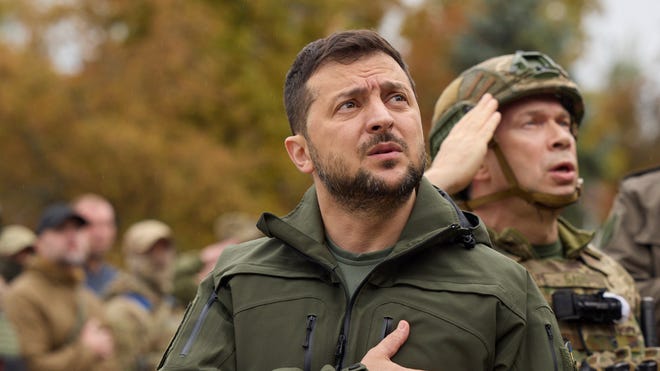Ukraine Crisis: How Trump Altered The US-Europe Response To Russia

Table of Contents
Trump's Ambivalence Towards NATO and European Allies
Trump's presidency was marked by a noticeable ambivalence towards traditional US alliances, particularly NATO. This had profound consequences for the collective response to Russian aggression in Ukraine.
Weakening Transatlantic Unity
Trump's repeated questioning of NATO's relevance and value, frequently expressed on the world stage, created significant discord within the alliance. His actions actively undermined the decades-long bedrock of transatlantic security cooperation.
- Public questioning of Article 5 commitments: Trump's public pronouncements about the potential non-application of Article 5, the cornerstone of collective defense, created uncertainty and eroded trust among allies.
- Withdrawal threats and demands for increased financial contributions from allies: His consistent pressure on European allies to increase their defense spending, often coupled with thinly veiled threats of withdrawal, further destabilized the alliance.
- Erosion of trust and collaborative security planning: This atmosphere of uncertainty hampered collaborative security planning and weakened the alliance's ability to present a united front against Russian aggression. The resulting mistrust made coordinated action far more difficult.
Reduced US Credibility as a Security Guarantor
Trump's actions significantly reduced US credibility as a security guarantor for its European allies, including those bordering Russia. This emboldened Vladimir Putin and his government.
- Uncertainty regarding US commitment to defending Eastern European NATO members: The ambiguity surrounding the US commitment to defend Eastern European NATO members fueled anxieties and increased their vulnerability to Russian pressure.
- Increased vulnerability for Ukraine and neighboring countries: Ukraine, although not a NATO member, relied heavily on implicit US support against Russian encroachment. Trump's rhetoric and policies diminished this support.
- Limited diplomatic leverage against Russia: The diminished credibility of the US significantly limited its diplomatic leverage in dealing with Russia and its actions in Ukraine.
Trump's Interactions with Vladimir Putin
Trump's interactions with Vladimir Putin were another critical factor influencing the West's response to the Ukraine crisis. His approach stood in stark contrast to that of many European leaders and US intelligence agencies.
Unusually Positive Rhetoric Towards Putin
Trump's consistently positive statements about Putin and his repeated reluctance to criticize Putin's actions were highly controversial.
- Public praise of Putin’s leadership: Trump's public praise of Putin's leadership, despite overwhelming evidence of Russian aggression and human rights abuses, sent a troubling message to allies and adversaries alike.
- Dismissal of Russian interference in the 2016 US election: Trump's downplaying and dismissal of Russian interference in the 2016 US election further fueled concerns about his susceptibility to Russian influence.
- Hesitation to impose meaningful sanctions on Russia: The Trump administration's hesitancy to impose or maintain meaningful sanctions on Russia, despite numerous provocations, indicated a lack of seriousness in confronting Russian aggression.
Lack of Robust Response to Russian Aggression
The Trump administration's response to Russian aggression in Ukraine was widely criticized for being slow, inadequate, and often lacking in resolve.
- Delayed or weakened sanctions against Russia: Sanctions, when imposed, were often diluted or delayed, limiting their effectiveness in deterring further Russian aggression.
- Limited military assistance to Ukraine: The administration's approach to military assistance to Ukraine was also seen as insufficient to meet the country's needs.
- Reluctance to actively counter Russian disinformation campaigns: The administration's apparent reluctance to counter Russian disinformation campaigns allowed these campaigns to flourish and undermine Western efforts.
Impact on Ukraine's Security and the European Response
Trump's policies had a significant impact on both Ukraine's security and the subsequent response from European nations.
Increased Vulnerability for Ukraine
The perceived weakening of US support under Trump's presidency left Ukraine significantly more vulnerable to further Russian aggression.
- Diminished prospects for NATO membership: Trump's attitude towards NATO further diminished Ukraine's already slim prospects for membership, leaving it strategically isolated.
- Increased reliance on European support, which itself was complicated by divisions within the EU: Ukraine became increasingly reliant on support from European nations, a situation complicated by the existing internal divisions within the European Union.
- Heightened risk of further Russian escalation: The perceived weakening of US commitment led to a heightened risk of further Russian escalation in Ukraine.
Shifting European Strategies
European nations responded to the perceived unreliability of the US security guarantee by reassessing their security strategies.
- Increased defense spending by some European countries: Several European countries responded by increasing their defense spending and bolstering their military capabilities.
- Strengthened EU-level defense initiatives: The EU also saw a renewed focus on enhancing its own defense capabilities and initiatives.
- Greater focus on European strategic autonomy: This period witnessed a greater emphasis on the development of European strategic autonomy, reducing reliance on the US for security.
Conclusion
Donald Trump's presidency undeniably altered the US-Europe response to the Ukraine crisis. His ambivalence towards NATO, his unusually positive interactions with Vladimir Putin, and his administration's reluctance to forcefully counter Russian aggression left Ukraine more vulnerable and severely strained transatlantic relations. This period underscored the critical importance of a unified and resolute Western response to Russian expansionism and triggered a reassessment of European security strategies. Understanding Trump's impact on Ukraine-Russia relations is crucial for navigating the current geopolitical complexities and preventing similar crises in the future. Further research into the long-term ramifications of these policies is vital to understanding the enduring legacy of this pivotal period in international relations. We must continue to analyze Trump's impact on Ukraine-Russia relations to effectively address future challenges.

Featured Posts
-
 Raducanus Dubai Tennis Championships Exit Muchova Victory
May 14, 2025
Raducanus Dubai Tennis Championships Exit Muchova Victory
May 14, 2025 -
 Saechsische Schweiz Osterzgebirge Entwarnung Fuer Hohburkersdorf Lagebericht
May 14, 2025
Saechsische Schweiz Osterzgebirge Entwarnung Fuer Hohburkersdorf Lagebericht
May 14, 2025 -
 Is Captain America Brave New World The Mcus Redemption After A Dark Period
May 14, 2025
Is Captain America Brave New World The Mcus Redemption After A Dark Period
May 14, 2025 -
 Captain America 4 Brave New World Disney Premiere Date Confirmed
May 14, 2025
Captain America 4 Brave New World Disney Premiere Date Confirmed
May 14, 2025 -
 The Voice Season 27 Episode 3 Adam Levines Performance Analyzed
May 14, 2025
The Voice Season 27 Episode 3 Adam Levines Performance Analyzed
May 14, 2025
Latest Posts
-
 Discover Lindts New Chocolate Paradise A Central London Treat
May 14, 2025
Discover Lindts New Chocolate Paradise A Central London Treat
May 14, 2025 -
 Cetiri Blizanca Rodzera Federera Slike I Informacije
May 14, 2025
Cetiri Blizanca Rodzera Federera Slike I Informacije
May 14, 2025 -
 Experience Chocolate Bliss Lindt Opens In Central London
May 14, 2025
Experience Chocolate Bliss Lindt Opens In Central London
May 14, 2025 -
 Federerovi Blizanci Novo Otkrice O Decijem Zivotu
May 14, 2025
Federerovi Blizanci Novo Otkrice O Decijem Zivotu
May 14, 2025 -
 Central London Welcomes Lindts Chocolate Haven
May 14, 2025
Central London Welcomes Lindts Chocolate Haven
May 14, 2025
